Program Management Phase for Business Continuity Management Planning Methodology for Hospital
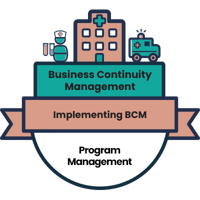 The Program Management Phase is a critical component in the Business Continuity Management (BCM) planning methodology for hospitals, ensuring the sustainability and ongoing relevance of the hospital’s business continuity plan (BCP). This phase follows the development and testing stages and focuses on the continuous oversight, evaluation, and enhancement of the hospital’s BCM efforts. Hospitals are complex organizations that operate in a constantly changing environment, with shifts in technology, regulations, and patient care practices. Therefore, it is essential that the BCP is effective at its creation and continuously updated and refined to address new risks, operational challenges, and emerging healthcare needs.
The Program Management Phase is a critical component in the Business Continuity Management (BCM) planning methodology for hospitals, ensuring the sustainability and ongoing relevance of the hospital’s business continuity plan (BCP). This phase follows the development and testing stages and focuses on the continuous oversight, evaluation, and enhancement of the hospital’s BCM efforts. Hospitals are complex organizations that operate in a constantly changing environment, with shifts in technology, regulations, and patient care practices. Therefore, it is essential that the BCP is effective at its creation and continuously updated and refined to address new risks, operational challenges, and emerging healthcare needs.
/Hospital_E2_C8.png?width=250&height=250&name=Hospital_E2_C8.png) The Program Management Phase is dedicated to embedding business continuity as an integral part of the hospital’s organizational culture and governance. It involves managing the BCP on an ongoing basis, ensuring that all aspects of the plan are actively maintained, regularly reviewed, and aligned with the hospital’s strategic goals. This phase also emphasizes stakeholder engagement, ensuring that key hospital staff, leadership, and external partners remain involved in the BCM program. Effective governance structures and performance metrics are established during this phase to ensure accountability and measure the BCP's effectiveness during real-life incidents and exercises.
The Program Management Phase is dedicated to embedding business continuity as an integral part of the hospital’s organizational culture and governance. It involves managing the BCP on an ongoing basis, ensuring that all aspects of the plan are actively maintained, regularly reviewed, and aligned with the hospital’s strategic goals. This phase also emphasizes stakeholder engagement, ensuring that key hospital staff, leadership, and external partners remain involved in the BCM program. Effective governance structures and performance metrics are established during this phase to ensure accountability and measure the BCP's effectiveness during real-life incidents and exercises.
Another key aspect of the Program Management Phase is fostering a culture of continuous improvement. The BCM program is evaluated through a systematic review of tests, drills, and actual incidents, and any weaknesses or gaps are addressed. This ensures that the hospital remains resilient, adaptive, and prepared to handle various potential disruptions. In summary, the Program Management Phase is about ensuring that the BCP remains dynamic, relevant, and capable of ensuring the continuity of essential hospital functions, even during emergencies.
Continuous Monitoring and Improvement
In the Program Management Phase, the focus is on continuously monitoring the hospital’s BCP to ensure it remains up-to-date and capable of addressing emerging risks. Hospitals operate in a dynamic environment, with technological, regulatory, and operational changes constantly affecting their business continuity needs. To address this, the program management phase emphasizes ongoing evaluation of the hospital’s business continuity needs and the plan's effectiveness. Regularly reviewing and updating the BCP ensures that the hospital can adapt to new threats, changing healthcare requirements, and advances in medical technology. Key elements that should be reviewed include risk assessments, business impact analysis (BIA) results, and hospital operations changes that may require continuity plan adjustments.
Moreover, program management involves tracking the success and lessons learned from business continuity exercises and real-life incidents. This feedback loop is critical for improving the BCP, as it helps identify areas that need strengthening, refining response strategies, and addressing any gaps that may have been missed in previous planning stages. Performance metrics, such as recovery time objectives (RTOs), recovery point objectives (RPOs), and operational downtime, are monitored to measure the effectiveness of the hospital’s recovery efforts during an emergency. The outcome of these evaluations is used to optimize the hospital's BCM program, ensuring that it remains resilient and ready to handle any future disruptions.
Stakeholder Engagement and Governance
Effective Program Management also involves the continuous engagement of internal and external stakeholders to ensure that business continuity remains a priority at all levels of the hospital. The hospital’s leadership team, department heads, IT staff, clinical teams, and external partners must be involved in the governance process to guarantee coordination and accountability. A dedicated BCM committee or steering group can help manage the implementation and maintenance of the BCM program, ensuring that business continuity is prioritized across all areas of hospital operations. By fostering a culture of resilience and preparedness, hospital leaders can ensure that all stakeholders understand their roles in the event of a disruption and are committed to maintaining the effectiveness of the hospital’s BCP.
Governance structures should also incorporate regular audits, assessments, and evaluations of the BCM program. These measures are essential for demonstrating compliance with relevant regulations and standards, such as ISO 22301, which guides business continuity management. Additionally, hospitals should ensure that there is sufficient training and resources available to maintain staff awareness and readiness for business continuity efforts. The program management phase also involves strategic planning to integrate business continuity into the hospital’s overall risk management and emergency response frameworks. This ensures the BCM program is well-positioned to adapt to future challenges.
Summing Up…
The Program Management Phase in the Business Continuity Management (BCM) planning methodology for hospitals ensures that the business continuity plan (BCP) remains practical and relevant over time. It involves the ongoing oversight and continuous evaluation of the plan to adapt to new risks, regulatory changes, and operational shifts in the hospital environment. This phase emphasizes integrating BCM practices into the hospital’s governance framework, fostering a culture of preparedness and resilience across all hospital levels. Regular reviews and performance metrics are used to measure the BCP's effectiveness and make necessary improvements.
Additionally, the Program Management Phase focuses on stakeholder engagement and strategic planning. It ensures that leadership, staff, and external partners remain committed to the continuity efforts through structured governance and regular audits. By embedding BCM into the hospital’s organizational structure, this phase helps ensure that business continuity remains a priority and is effectively maintained, providing the hospital’s capacity to continue operations during emergencies. Ultimately, this phase guarantees that the BCP evolves to meet future challenges, securing the hospital’s ability to deliver critical healthcare services without disruption.
More Information About Business Continuity Management Courses

 To learn more about the course and schedule, click the buttons below for the BCM-300 Business Continuity Management Implementer [B-3] course and the BCM-5000 Business Continuity Management Expert Implementer [B-5].
To learn more about the course and schedule, click the buttons below for the BCM-300 Business Continuity Management Implementer [B-3] course and the BCM-5000 Business Continuity Management Expert Implementer [B-5].
![Register [BL-B-3]*](https://no-cache.hubspot.com/cta/default/3893111/ac6cf073-4cdd-4541-91ed-889f731d5076.png) |
 |
 |
 |
 |
 |
![FAQ [BL-B-3]](https://no-cache.hubspot.com/cta/default/3893111/b3824ba1-7aa1-4eb6-bef8-94f57121c5ae.png) |
If you have any questions, click to contact us.
|
 |
 |
 |
 |


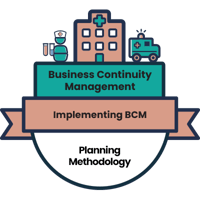
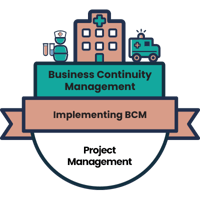
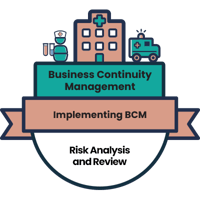
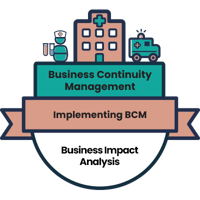
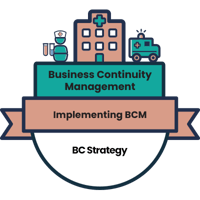
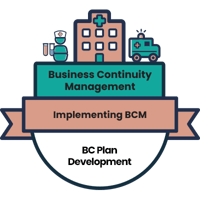
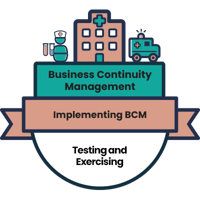
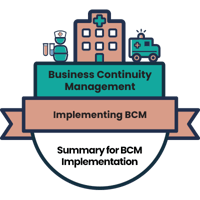
![Email to Sales Team [BCM Institute]](https://no-cache.hubspot.com/cta/default/3893111/3c53daeb-2836-4843-b0e0-645baee2ab9e.png)

